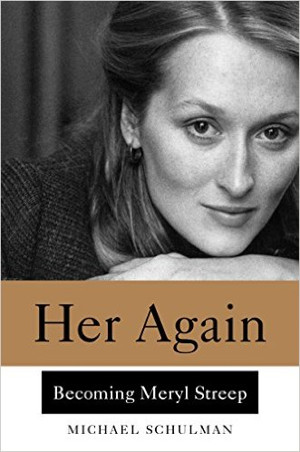 This new book on Meryl's rise will be released at the end of AprilIf you haven't yet chanced upon it or been directed there by multiple excited tweets, make sure to read this excerpt / reworking of a passage from a forthcoming book by Michael Schulman on Meryl Streep's rise to fame via Kramer vs Kramer that's currently gracing Vanity Fair. We've talked about Kramer vs Kramer multiple times here at TFE and it's been heartening to see the critical tide at least slightly turning in the blockbuster drama's favor of late. For a long time cinephiles seemed to despise it, due in no small part to its Oscars. When you beat noticeably ambitious artistic and stylized masterpieces like Apocalypse Now and All That Jazz to the Best Picture crown there's bound to be a backlash if your film is merely human-sized, no matter how resonant and superbly acted it may be. But, a truth, that's always worth noting in movie buff wars: every year has multiple films worthy of praise and just because one gets singled out in the moment, it doesn't mean its worthy of your ire.
This new book on Meryl's rise will be released at the end of AprilIf you haven't yet chanced upon it or been directed there by multiple excited tweets, make sure to read this excerpt / reworking of a passage from a forthcoming book by Michael Schulman on Meryl Streep's rise to fame via Kramer vs Kramer that's currently gracing Vanity Fair. We've talked about Kramer vs Kramer multiple times here at TFE and it's been heartening to see the critical tide at least slightly turning in the blockbuster drama's favor of late. For a long time cinephiles seemed to despise it, due in no small part to its Oscars. When you beat noticeably ambitious artistic and stylized masterpieces like Apocalypse Now and All That Jazz to the Best Picture crown there's bound to be a backlash if your film is merely human-sized, no matter how resonant and superbly acted it may be. But, a truth, that's always worth noting in movie buff wars: every year has multiple films worthy of praise and just because one gets singled out in the moment, it doesn't mean its worthy of your ire.
But I digress. Read this piece! Here's a bit about the fantasies, realities, and fictions around Meryl Streep's audition -- nobody actually knows which is which since the accounts are different depending on who is interviewed:
Meryl marched into the hotel suite where Hoffman, Benton, and Jaffe sat side by side. She had read Corman’s novel and found Joanna to be “an ogre, a princess, an ass,” as she put it soon after to American Film. When Dustin asked her what she thought of the story, she told him in no uncertain terms. They had the character all wrong, she insisted. Her reasons for leaving Ted are too hazy. We should understand why she comes back for custody. When she gives up Billy in the final scene, it should be for the boy’s sake, not hers. Joanna isn’t a villain; she’s a reflection of a real struggle that women are going through across the country, and the audience should feel some sympathy for her. If they wanted Meryl, they’d need to do re-writes, she later told Ms. magazine.
The trio was taken aback, mostly because they hadn’t called her in for Joanna in the first place. They were thinking of her for the minor role of Phyllis, the one-night stand. Somehow she’d gotten the wrong message. Still, she seemed to understand the character instinctively. Maybe this was their Joanna after all?
That, at least, was Meryl’s version. The story the men told was completely different...